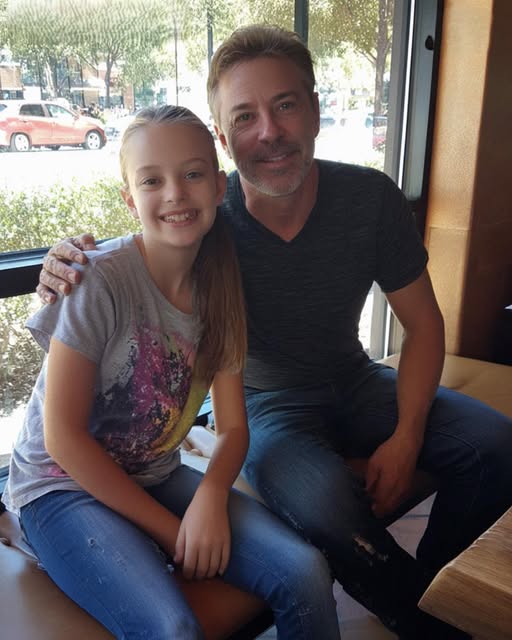From that moment, our lives shifted into crisis mode. Travis returned from visits with hollow eyes, spreading bills across the kitchen table like battle plans. “Three hundred dollars a session,” he murmured. “Insurance barely covers anything. She needs at least two a week.” He never asked me directly for money. He didn’t need to—his desperation filled the house like smoke.
“Don’t worry about the cost,” I told him, squeezing his hand. “We’ll figure it out together. Lily needs this.”
Tears welled in his eyes. “I don’t deserve you.”
I started transferring money into his account. Five thousand. Then seven. Then ten. Each time, the “needs” increased. I emptied my savings, then cashed out my grandmother’s inheritance. “The specialist says she’s improving,” Travis would report. “But there’s a new therapy that could really help.” By the end of the year, I had given him $85,000. I told myself no price was too high to help a child walk again.
But unease grew. When I saw Lily at the park, she moved well—maybe a slight hitch in her step, but she climbed, ran, and laughed. “She’s brave,” Travis said when I asked. “She pushes through the pain. Overcompensation can cause damage long-term.” If I asked to attend a session, he refused. “Strict policy. She gets anxious around strangers.” If I suggested celebrating progress, he postponed. “She’s exhausted after therapy.” Somehow, next week never came.
The truth came crashing down one Tuesday. I came home early with a migraine and moved quietly through the house. Passing the office, I froze. Travis sat at his desk, counting thick stacks of cash bound in rubber bands. Bundles filled his briefcase. He muttered totals under his breath. My stomach dropped. We were supposedly broke. Where had this money come from?
I backed away, then reopened the front door loudly to announce myself. By the time he appeared, the money was gone, the office door locked. “Hey, babe,” he said casually, kissing my forehead.
That night, while he slept, I opened his laptop. The browser was already on a child talent agency site. Headshots of kids filled the page. My scrolling finger stopped cold. There she was. Lily. Different name, polished profile: “Great with emotional scenes. $200 per booking.”
She wasn’t his daughter. She was a child actress.
I dug deeper. A folder labeled “Lily Bookings” contained receipts for staged park visits and café meetings, written like business expenses. Another folder, “Rachel – New House,” held mortgage documents, furniture invoices, and emails dripping with affection for a woman I had never heard of. The latest message had a photo attached: Travis kissing Rachel in front of a two-story house. Subject line: “Our dream home. Thanks to the down payment!”
My $85,000 hadn’t gone to therapy. It had bought his mistress a house.
For two weeks, I played the perfect wife. I smiled at breakfast, asked about his day, and planned a “special weekend.” Quietly, I gathered evidence—screenshots, emails, bank transfers, photos. I stacked it into a folder heavy enough to end things cleanly.
“Let’s do something special Friday,” I suggested. “I’ll cook your favorites. I’ve invited someone.”
He grinned, unsuspecting.
That night, I roasted chicken, garlic potatoes, and his favorite chocolate cake. I set the table with our wedding china. At seven sharp, the doorbell rang. A man in a sharp suit stood with a folder.
“Good evening, Mia,” he said.
“Travis,” I smiled sweetly, “this is Mr. Chen, my lawyer. He has some papers for you.”
Mr. Chen slid the folder across the table. Travis opened it, face draining of color. Divorce papers. Evidence of financial fraud. Documentation of the fake therapy scheme. Photos of him with Rachel in front of their house.
“Mia, I can explain,” he stammered. “It’s not what it looks like.”
“Really?” I asked. “Because it looks exactly like you hired a child actress to pose as your injured daughter so you could siphon $85,000 and play house with your mistress.”
Mr. Chen added firmly, “All joint assets are frozen pending litigation. Any direct contact with my client will be considered harassment.”
Travis shoved back from the table. “You can’t do this. We’re married. We can work it out.”
“The way you worked out Lily’s ‘therapy’?” I asked coolly.
He begged for time. I told him time was up. That night, he packed and left. Within a week, Rachel dumped him. Court lasted four months, but I won: the house, his car, restitution, and damages.
The first time I walked into “their” dream home, I felt peace. The granite counters were perfect for kneading dough, the sunlit dining room begged for wedding cakes, the spare room fit for an office. Travis thought he bought a love nest; in reality, he picked the perfect spot for Mia’s Custom Bakery.
Now my business license hangs proudly in the front window. Every morning, I wake in a house built on lies but filled with honesty, turning betrayal into bread, grief into growth. Sometimes, I wonder if Travis drives by and sees the sign, smells the bread. I hope he does.
People ask what hurt most—the money, the betrayal, the wasted time. None of those. What cut deepest was that I gave him trust and boundaries, and he treated them like obstacles to maneuver. Respect is the foundation of love. Without it, everything else is just noise.
In the end, he thought he conned me. But every loaf rising in my kitchen tells the truth: I got the last laugh. Justice, warm from the oven.

